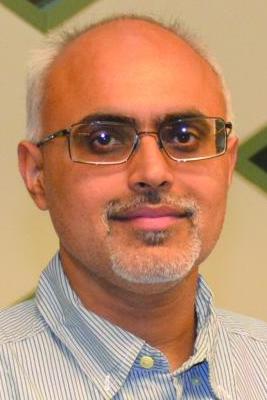Spring ’24 CSC@USC/CommNetS-MHI Seminar Series
 |
Prashant Mehta,
University of Illinois Urbana-Champaign
|
Abstract
There is a certain magic in writing the variational form of the equations in physics and engineering. The most magical of these is Lagrange’s formulation of the Newtonian mechanics. An accessible modern take on this and more appears in the Feb 2019 Issue of The New Yorker
I describe a new variational (optimal control-type) formulation of the nonlinear filtering problem, an important feature of which is that the arrow of time reverses. The reversal of time brings about all sorts of paradoxes involving causality. Scenes from Christopher Nolan's sci-fi movie Tenet may be shown for entertainment and educational purposes.
Apart from movie snippets, the talk will also include technical content. Specifically, I argue that certain foundational aspects of Control Theory – duality between estimation and control – are less than well-understood for nonlinear stochastic systems (hidden Markov models), in part because of the issue of time reversal. Based on the optimal control formulation, I will also discuss some new results on the asymptotic stability of the nonlinear filter.
This is joint work with Jin Won Kim. The talk is based on the following papers: Paper 1; Paper 2; Paper 3
Biosketch
Prashant Mehta is a Professor in the Coordinated Science Laboratory (CSL) and the Department of Mechanical Science and Engineering, University of Illinois at Urbana-Champaign (UIUC). He received his Ph.D. in Applied Mathematics from Cornell University in 2004. He was the co-founder and the Chief Science Officer of the startup Rithmio whose gesture recognition technology was acquired by Bosch Sensortec in 2017. Prior to his academic appointment at UIUC in 2005, he worked at United Technologies Research Center (UTRC) where he co-invented the symmetry-breaking solution to suppress combustion instabilities. This solution — which helped solve a sixty-year old open problem — has since become an industry standard and is widely deployed in jet engines and afterburners sold by Pratt and Whitney.
Prashant Mehta received the Outstanding Achievement Award at UTRC for his contributions to modeling and control of combustion instabilities in jet-engines. His students have received the Best Student Paper Awards at the IEEE Conference on Decision and Control in 2007, 2009, and most recently in 2019; and have been finalists for these awards in 2010 and 2012. He serves as a member of the IEEE Control Systems Society (CSS) Awards Board and as an Associate Editor for the IEEE Transactions on Automatic Control (2019-present). He is a Fellow of IEEE.
Acknowledgement: seminar series is supported by the Ming Hsieh Institute and Quanser.
